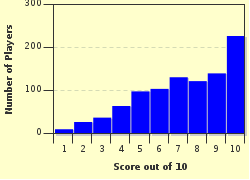Quiz Answer Key and Fun Facts
1. The actual word "treason" has its roots in perhaps the most (in)famous betrayal of all time - that of Jesus Christ by Judas Iscariot. How does the Latin word 'traditorem' actually translate directly into English?
2. Until The Treason Act of 1814 changed the law in England, a man who was found guilty of high treason could be punished by being hung, drawn, and quartered! What was the most severe punishment that could be meted out to a woman who was deemed guilty of High Treason?
3. One man is so (in)famous for his treachery that his very name has passed into folklore as a synonym for a turncoat or traitor. Norwegian army officer Quisling was eventually tried for high treason and executed; do you know what his first name was?
4. Treason has often been said to be worst crime possible as it is against the State rather than personal. A title character from one of Shakespeare's plays says "They could not, would not do 't; 'tis worse than murder" when he finds out that a close family member has turned against him and dishonoured him publicly. Which character says this?
5. In the epic poem "Nibelungenlied", the Hero is stabbed in the back by Hagen von Tronje. Who is this Hero?
6. Adultery is considered by most people to constitute a serious betrayal of one's spouse. One very famous divorce case in the UK in the 1960s involved some scandalous Polaroid photographs of Margaret, Duchess of Argyll and an unidentified man who was not the Duke! How did the man in the pictures come to be known by the press?
7. Whether or not Julius Caesar actually cried out "Et tu, Brutus?" at the sight of his dear friend and compatriot among his assassins, we will never know. This supreme act of treasonous betrayal on the part of Marcus Junius Brutus and his associates took place infamously on "The Ides of March". What date is the Ides of March?
8. In which country is it treasonous to "commit offences against the person of" or "wage war against" the Yang di-Pertuan Agong?
9. In 1924, Adolf Hitler was tried and convicted of high treason, following the 'Beer Hall Putsch' of November 1923. What sentence was passed on him at this trial?
10. In Dante's work "The Divine Comedy", he tells us that the Ninth Circle of Hell is reserved for those who betray others. There are four rings of the Ninth Circle; which of these is NOT one of them?
Source: Author
Rowena8482
This quiz was reviewed by FunTrivia editor
trident before going online.
Any errors found in FunTrivia content are routinely corrected through our feedback system.


